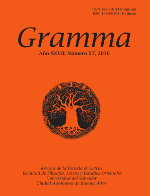Máquina para el Dolor: Yo-Dios-Naturaleza Identidad y Placer en Un Aprendizaje o El Libro de los Placeres
Keywords:
Identity, Body without Organs, Pain, God, BecomingAbstract
The purpose of this article is to analyze the book Un aprendizaje o el Libro de los Placeres (2003) and the way Lori, its main character, constructs her personality when perceiving herself only through pain in addition to the changes such notion is submitted to. The approach of Deleuze and Guattari in Mil mesetas (2002) and their concept of«body without organs» provide us with clear evidence to interpret the codification the character makes of herself and therefore of the world. The vital suffering that Lori endures helps her to initiate life and also works as a language to be able to tell reality. As the noveldevelops, Lori empties herself, desmembers her ego and gets nearer to a holistic perception of reality. She abandons the stiffness caused by pain and realizes that she is in the world and therefore she will become with it, that she is not only pain but many other things but simultaneously she is only one: if there is pain and pleasure in the world, that will occur to her too. The notion she creates of God and its variations along the book allow her to come closer to the epiphany that her personality is an illusion and that she is not unique, separated from the world but that she herself is reality constantly being. That is the remedy she finds for her suffering: transfering her consciousness from a masochistic body without organs to a bigger body without organs, unique and multiple, from which she thought to be distant.Downloads
Published
How to Cite
Issue
Section
License
Works published in this journal are licensed under a Creative Commons Attribution-NonCommercial-
Works published under this licence may be shared, copied and redistributed in any medium or format. Adaptation, remixing, transformation and creation are also authorised. Both sharing and adapting are permitted as long as credit is given to the work appropriately, providing a link to the licence and indicating whether changes have been made. Commercial use of the material is also not possible.








